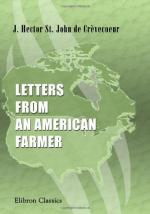Cape Cod, a frightful distemper had swept away a great
many along its coasts, which made the landing and
intrusion of our forefathers much easier than it otherwise
might have been. In the year 1763, above half
of the Indians of this island perished by a strange
fever, which the Europeans who nursed them never caught;
they appear to be a race doomed to recede and disappear
before the superior genius of the Europeans.
The only ancient custom of these people that is remembered
is, that in their mutual exchanges, forty sun-dried
clams, strung on a string, passed for the value of
what might be called a copper. They were strangers
to the use and value of wampum, so well known to those
of the main. The few families now remaining are
meek and harmless; their ancient ferocity is gone:
they were early christianised by the New England missionaries,
as well as those of the Vineyard, and of several other
parts of Massachusetts; and to this day they remain
strict observers of the laws and customs of that religion,
being carefully taught while young. Their sedentary
life has led them to this degree of civilisation much
more effectually, than if they had still remained
hunters. They are fond of the sea, and expert
mariners. They have learned from the Quakers
the art of catching both the cod and whale, in consequence
of which, five of them always make part of the complement
of men requisite to fit out a whaleboat. Many
have removed hither from the Vineyard, on which account
they are more numerous on Nantucket, than anywhere
else.
It is strange what revolution has happened among them
in less than two hundred years! What is become
of those numerous tribes which formerly inhabited
the extensive shores of the great bay of Massachusetts?
Even from Numkeag (Salem), Saugus (Lynn), Shawmut
(Boston), Pataxet, Napouset (Milton), Matapan (Dorchester),
Winesimet (Chelsea), Poiasset, Pokanoket (New Plymouth),
Suecanosset (Falmouth), Titicut (Chatham). Nobscusset
(Yarmouth), Naussit (Eastham), Hyannees (Barnstable),
etc., and many others who lived on sea-shores
of above three hundred miles in length; without mentioning
those powerful tribes which once dwelt between the
rivers Hudson, Connecticut, Piskataqua, and Kennebeck,
the Mehikaudret, Mohiguine, Pequods, Narragansets,
Nianticks, Massachusetts, Wamponougs, Nipnets, Tarranteens,
etc.—They are gone, and every memorial
of them is lost; no vestiges whatever are left of those
swarms which once inhabited this country, and replenished
both sides of the great peninsula of Cape Cod:
not even one of the posterity of the famous Masconomeo
is left (the sachem of Cape Ann); not one of the descendants
of Massasoit, father of Metacomet (Philip), and Wamsutta
(Alexander), he who first conveyed some lands to the
Plymouth Company. They have all disappeared either
in the wars which the Europeans carried on against
them, or else they have mouldered away, gathered in
some of their ancient towns, in contempt and oblivion:




